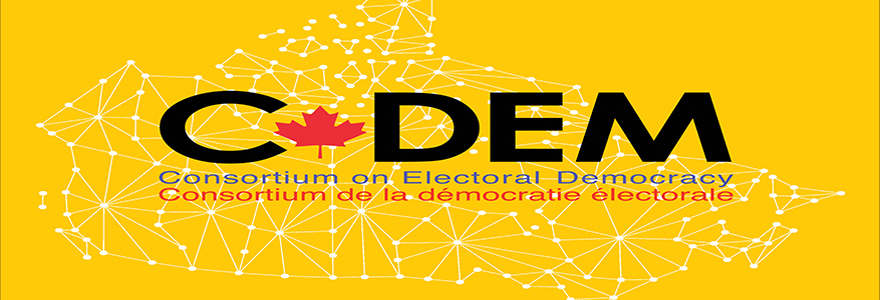Democracy Project Heads SSHRC Recipients
Beset by political mis-information, dis-information, populism and polarization, democracy faces some of its biggest challenges in a generation. Now, a new Western-led partnership aims to take the pulse of Canadian democracy and improve the health of electoral participation.
The Consortium on Electoral Democracy/Consortium de la démocratie électorale (C-dem) is a nation-wide research network addressing issues central to a robust nation – political engagement, representation, public opinion, electoral behaviour and systems, electioneering and factors that shape and make policy. Political Science professor Laura Stephenson is principal investigator of the project, newly awarded $2.5 million from the Social Sciences and Humanities Research Council (SSHRC).The grant is the largest among the 97 Western projects and research areas which will collectively receive $8.4 million in SSHRC grants as part of a $285-million funding announcement made Wednesday by Federal Science Minister Kirsty Duncan. For a full list of recipients, their research, and their respective awards, please click here.
C-Dem collects and analyzes survey data and works with 23 partners to study electoral democracy, during and between elections. The research will be some of the most comprehensive of its kind ever undertaken in Canada.
“The consortium is a research project – on steroids,” said Stephenson, an expert on electoral attitudes and political behaviour.
The C-Dem will also administer the Canadian Election Study (CES) which, since 1965, has generated non-partisan public-opinion data on Canadian electoral attitudes. The CES has had a variety of funding sources over time, including Elections Canada and it now finds a research home with the consortium. During the next seven years, C-Dem will co-ordinate telephone and online surveys at the federal and provincial level, with more than 10,000 observations across that time that will generate a moving picture of who Canadians are and what they believe about key issues, such as:
Are you satisfied with how democracy works in Canada?
How much attention do you pay to education issues, social welfare, and the environment?
Do you plan to vote in the next election?
Should personal income tax increase or decrease; what about corporate tax?
Does Canada have too much immigration, or not enough?
How much attention do you pay to politicians' social media accounts?
What are your main primary sources of political and voting information?
“We want to understand more about the attitudes of Canadians so we can better prescribe programs and get more people involved,” Stephenson said. It will harness the expertise of four universities – Western University, University of Quebec at Montreal, Ryerson University and University of Toronto – along with several public-policy groups generating data and seeking to improve healthy democratic processes and structures.
The consortium is non-partisan. And it’s designed to help researchers, electoral management boards, policy-makers, and civil society organizations build on mutual interests, pool resources and share knowledge about the health of democracy across the country – both in snapshots and across time. Following a model of cooperative studies pioneered in the United States and the United Kingdom and the Local Parliament Project in Canada in 2015, academics and other interested groups will have the opportunity to buy space on the survey for issues of specific interest to them. This information will also be available to the public.
The consortium is also a training ground for a new generation of researchers: almost 150 people training in survey development, analysis, and communicating research to diverse audiences. It will create hands-on training with partners through internships; build an interactive website to provide data visualization to the public; be host to an annual forum, academic workshops and two international symposia; be sponsor of an annual youth documentary film project; academic workshops; and create new tools for teachers to help integrate electoral data into classrooms.
The project is a timely one, as democratic institutions and conventions seem increasingly under fire and as politicans mobilize dissent as a weapon of elected office: Tweetstorms that label dissent as unpatriotic. Legislative shouting matches that degenerate into name-calling and race-baiting. Gerrymandering and vote suppression. Fiery threats labelled as either nationalism or condemned as xenophobia. Face-offs between left and right that broke no room for middle ground.
"The unspoken conventions politicians are expected not to adhere to are being crossed regularly," Stephenson said. "And understanding their roots and tactics - how politicans mobilize populist sentiments and turn them into policy - are also essential to understanding democracy."
"It's one thing to look at the U.S. and say, 'Look at what's happening down there,' but we (Canadians) shouldn't be that sanctimonious," Stephenson said. "There are many different reasons people have these attitudes and it's important to understand who holds them, why they hold them and how they express them."
“Elections are a game, they’re a race, and people want to win. They want to win at any cost – and we need to know what is that cost.” - Laura Stephenson
Duncan, in her announcement, said the new SSHRC funding will help 6,900 researchers and graduate students conduct important work in social-science research areas such as education, immigration, Indigenous health and the environment. "The social sciences and humanities are integral towards building a healthier, stronger and more prosperous Canada," Duncan said in a statement. "Since taking office, our government has worked hard to put science and research back to their rightful place. Today's grant recipients will help us make informed decisions about our communities, economy, health and future prosperity."
Back To Top

